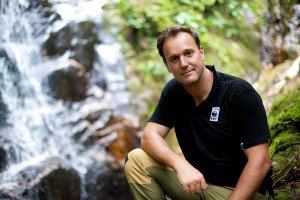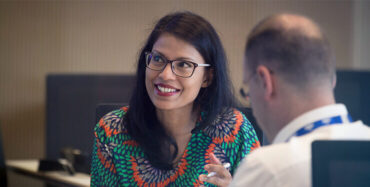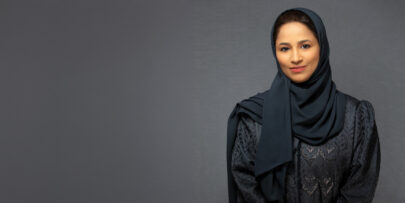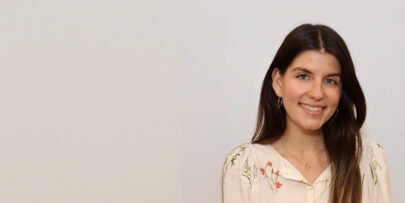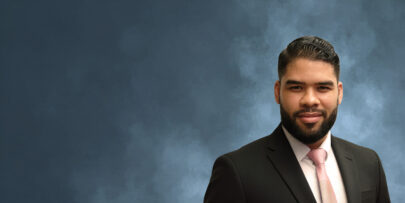
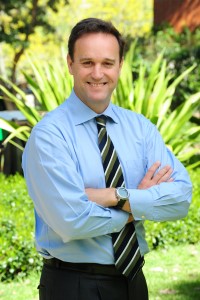
“It’s what I’d always wanted to be while I was growing up,” says O’Gorman.
He liked the job, but a career epiphany occurred when O’Gorman realized that what was happening outside of the parks was of greater interest. He quit and went travelling to Europe, eventually landing a role at the UK’s Countryside Commission – a former government agency which worked on landscape conservation, sustainable farming and rural development.
After that, he joined WWF’s UK branch.
“As you look at how environment fits into our society and our economy, you realize how fundamental it is to our foundations and our everyday life,” he says.
Since those early days, O’Gorman’s WWF career has continued to leap locations and roles. He’s been the Asia Pacific Region’s deputy director; its regional representative in the South Pacific (a Fiji-based role); and he spent nearly five years at the chief executive office of WWF China.
“It was culturally challenging; I learned an enormous amount about managing teams with different cultures. But I also realized that no matter where you are in the world, there are a lot of similarities in the ways people behave,” he says.
He’s also learned some key insights about leadership, particularly during his EMBA at IMD (O’Gorman also completed IMD’s Program for Executive Development):
“When I did my EMBA in Switzerland we spent a lot of time on the difference between leadership and management. Management is a lot around systematic approaches to delivering the business: Have I got the right teams? Have I put in the right systems and processes? There’s day-to-day, week-to-week and year-to-year stuff you have to do as a manager: but those type of things are not what inspire people.
“Pulling together a strategic plan doesn’t inspire somebody: it’s how you empower them to own those objectives, and to get out there and deliver them. [It’s also about] how you deal with conflict or adversity or crises: that’s all an important part of leadership,” he says.
For O’Gorman, CEOs should be able to switch tack between ‘leading’ and ‘management’, but when it comes to doing either cross culturally, there are two things he has relied on.
“First, you need very good listening skills. Second, I’ve always developed a network of advisors and mentors. Every time I’ve moved somewhere new, I’ve spoken to people who are not just in the environment sector – that gives me different insights,” he says.
For O’Gorman who now manages 100 staff in his role in Australia, large events like Earth Hour (created by WWF Australia in 2007) do have a role to play in the big picture of environmental change.
“I was sitting in Beijing at the time [of the first Earth Hour]. I watched it and thought, ‘We’ll have to do that in China’. I was surprised that by the next year we got the Chinese Government to turn off the lights on the Olympic stadium and the water cube,” he says.
“It showed how much that message resonated around the world, no matter what the culture. People want to see that they are not alone in caring about the environment, and that even though what they do may seem a small piece, if you get hundreds of millions of people doing it, it makes a difference,” he says.
Today, it’s that same connection to people which helps him stay the course in a battle that is for the long term.
“One of the privileges of my job is that I get to talk a lot to my supporters; we have about 900,000 plus on our database. I get letters, cards and calls and I get to meet people. I get a lot of energy from this. [You can] think of our supporters as our customers – being customer focused is very fashionable in business, but for me…I feel a responsibility to [them] to protect the planet.”
BY THE BOOKS:
Name: Dermot O’Gorman
The role: Chief executive officer, WWF Australia.
The task: Running Australia’s largest not-for-profit conservation organization, combining on-the-ground field projects, partnerships with business and government, and powerful advocacy to protect the natural world.
IMD qualifications:
Languages:
- Two years of Chinese Language study and French Language study (while living in Beijing and Geneva respectively).
What comes easily: “My strengths are in strategy and people. I love working with people and getting teams to hum.”
Words to live by: “Primi et ultimi in bello: It’s my family crest motto and it roughly translates as, “In at the beginning and there at the end” (of war). I believe that in work, as in life, it is all about making things happen, but also seeing them through to the end.”
